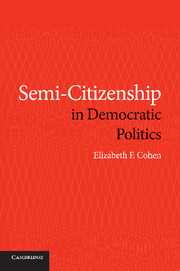Book contents
6 - Semi-Citizenship and the Disaggregation of Relative Rights
Published online by Cambridge University Press: 02 February 2010
Summary
INTRODUCTION
Non-refugee and non-migrant individuals, who can seemingly exercise the full set of rights associated with residence and free movement within a given territory, can also be semi-citizens. The disaggregation of autonomous rights such as those associated with residence and free movement demonstrates one way in which semi-citizenship is structured and institutionalized among these individuals. A series of layered doctrinal compromises that dictate, govern, and circumscribe the rights of residence and free movement create different statuses based on different kinds of reasoning. The disaggregation of autonomous rights of mobility thus exemplifies how doctrinal overlap and conflict is resolved through the creation of semi-citizenships. Semi-citizens who have some, but not all, of the rights associated with nationality come to have different bundles of other autonomous and relative rights, depending on how their partial nationality is constituted, and different circumstances, depending on what kinds of doctrinal compromises their statuses are subject to. If this were the end of the story regarding semi-citizenship it might lead us to a set of fairly tidy conclusions about how territory and ascription offer several paths to a relatively finite set of conditions for semi-citizenships. However, despite the abundance of work that attributes relationships of ascription to different types of rights, nationality does not always stand above, or serve as a gateway to, other types of rights. Thus, inevitably, there are native-born semi-citizens in every democratic nation-state.
- Type
- Chapter
- Information
- Semi-Citizenship in Democratic Politics , pp. 178 - 203Publisher: Cambridge University PressPrint publication year: 2009

